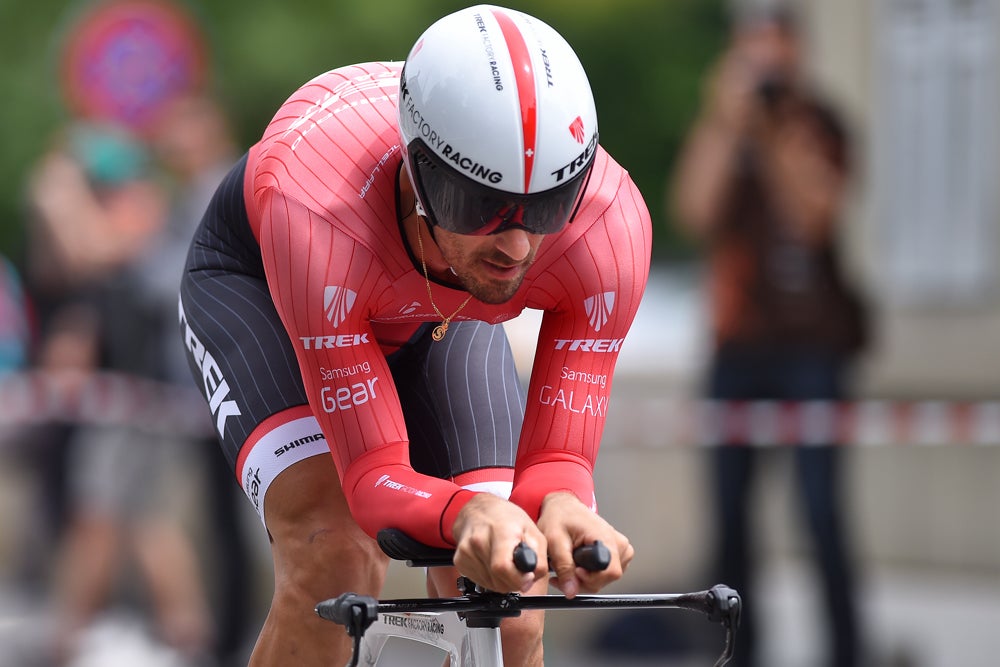Cancellara to retire after 2016 season

Fabian Cancellara ruled the time trial during the height of his career. Photo: Tim De Waele | <a href="http://www.tdwsport.com" target="_blank">TDWsport.com</a>
The Spartacus era is winding down. Fabian Cancellara confirmed this week to a Swiss broadcaster that the 2016 season will be his last.
The comments from the 34-year-old Swiss superstar echoed early hints that the days were numbered for Cancellara. Two major back injuries during the 2015 season knocked the Trek Factory Racing rider out of the spring classics and the world championships, spurring speculation that Cancellara would retire at the end of the coming season after he said it was the “right time” to end his 15-year career.
The announcement marks the beginning of the end of the Cancellara era. Few riders dominated their generation as much as the multi-talented Cancellara, who could win on a variety of terrain so long as it wasn’t too steep. Though he was unable to win a grand tour, he emerged as one of the best time trial specialists and classics strongmen of the past 20 years. His palmares are exceptional by every measure, with four world time trial championships, an Olympic gold medal, and seven monument victories as part of more than 70 professional wins.
Like any professional career, Cancellara suffered his share of disappointments. He fell short of his dream of winning the road world title, and crashed out of the London Olympics in 2012 when he was in pole position to win the road race gold medal. A string of injuries took their collective toll, including two painful back injuries in 2015, and helped spur his decision to retire next season.
Here a look at Cancellara’s five greatest hits:
Arrival of prologue man
After turning pro with Mapei in 2001 as part of the team’s “gruppo giovani” — the “young rider’s group” that also included Michael Rogers, Filippo Pozzato and Bernard Eisel — Cancellara’s first major breakout came in 2004, when he won the opening prologue in Liège at the Tour de France. That opened a long-running love affair with the maillot jaune. Cancellara would add three more prologue victories to his career haul of seven Tour stage wins, resulting in 29 days in the yellow jersey. That gives him the distinctive mark of having worn the most yellow jerseys for a rider who never won the overall title.
Chrono king
Cancellara’s growing prowess against the clock was confirmed in 2006, when he took the world title in Salzburg, Austria, beating Dave Zabriskie by more than one minute. The so-called “Swiss time machine” would soon dominate the race against the clock, winning a record four world titles in a span from 2006 to 2010. Some 33 of his career 64 pro wins came in prologues or individual time trials, with nine Swiss national TT titles along the way.
Olympic gold
After helping CSC teammate Carlos Sastre win the 2008 Tour de France, Cancellara went to Beijing as the heavy favorite to win the Olympic gold medal. First, he took the bronze medal in the Olympic road race (later bumped to silver after Davide Rebellin tested positive for CERA). Cancellara did not disappoint in the time trial, taking a dramatic victory over Gustav Larsson to claim the gold medal. His double-medal performance in Beijing earned him the Swiss Male Athlete of the Year, and propelled him to superstardom in his native country.
Cobbles harvest
Cancellara’s burly build and time trial skillset made him an ideal candidate for the spring classics. His first major win came with the 2006 Paris-Roubaix, opening a career-long rivalry with Tom Boonen across the cobbled northern classics. A winner of seven monuments (three Roubaix, three Flanders, one Milano-Sanremo), Cancellara’s coming of age over the cobbles came in 2010, when he won the Flanders warm-up, E3 Prijs Harelbeke, ahead of the first of two Flanders-Roubaix doubles in 2010.
Rule ‘Spartacus’
Cancellara’s apogee came in 2013, when he enjoyed his best spring classics run of his prodigious career. As his time trial skills were waning with the arrival of Tony Martin, his acumen over the cobbles only seemed to increase. After riding to third at Milano-Sanremo, “Spartacus” once again dominated the cobbles, winning the treble of E3-Harelbeke, Tour of Flanders, and Paris-Roubaix. His finale major classics victory came in 2014 with Flanders, the same year he was runner-up at Milano-Sanremo and third at Paris-Roubaix. Cancellara hopes to have one more run across the cobbles this spring.